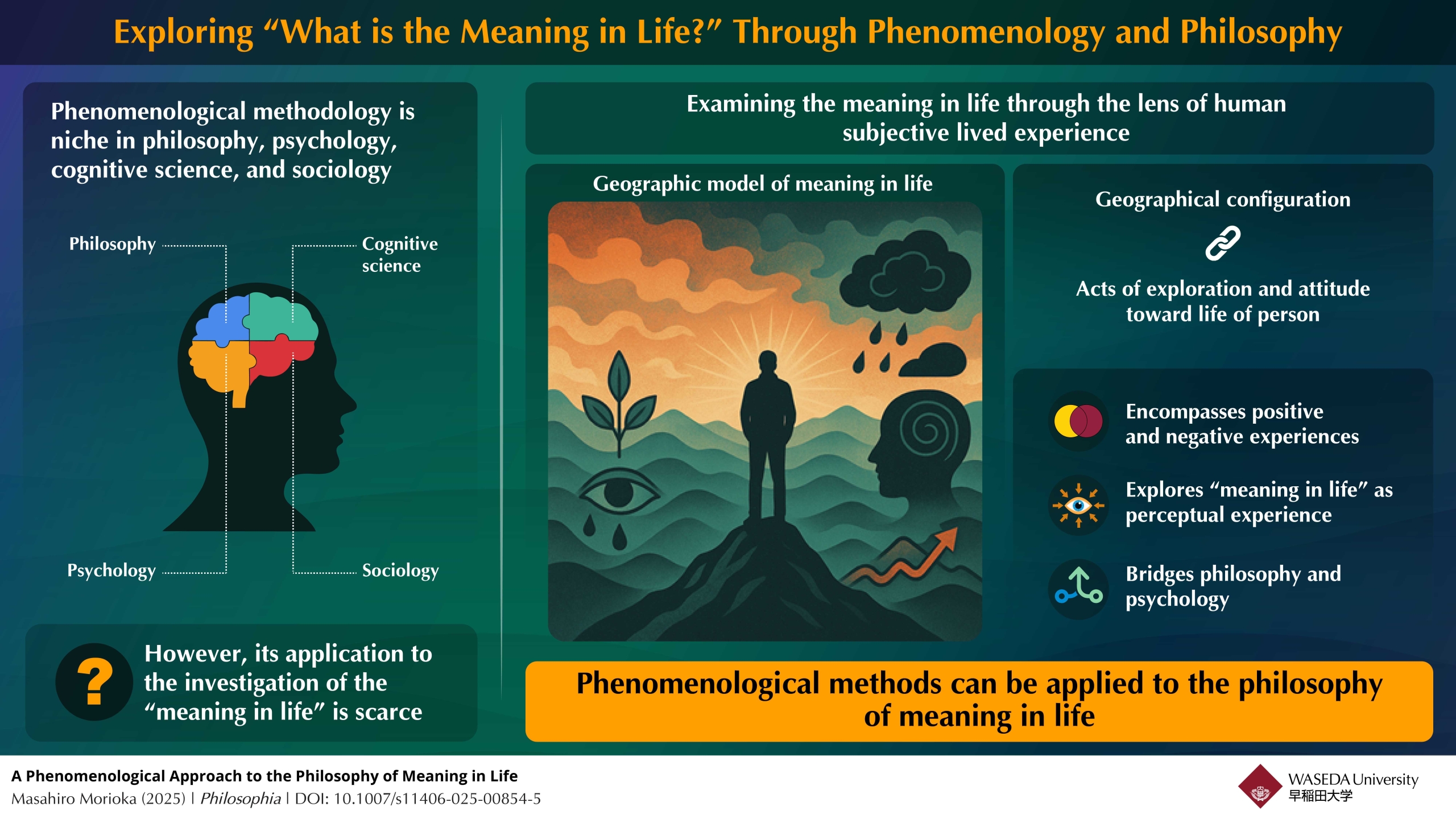Exploring the Meaning in Life Through Phenomenology and Philosophy
Fri, Jul 25, 2025-
Tags
Exploring the Meaning in Life Through Phenomenology and Philosophy
The work dwells on the relationship between affordance, enactivism, and human life
The question “What is the meaning in life?”, asked for millennia, is one of the central questions of philosophy. There has been a growing movement to approach this question by carefully analyzing the “meaning in life.” Now, Professor Masahiro Morioka of Waseda University has proposed a new idea: to explore “meaning in life” as a kind of geographical landscape experienced when a person tries to engage with their life with a certain attitude or intention.

Psychological and philosophical studies have long shown that a person’s subjective moods and emotions have a significant impact on how they experience the “meaning in life.” Philosopher Matthew Ratcliffe pointed out that a person’s mood vividly operates in the background of perception and plays a major role in how they grasp the meaning of their life.
In psychology as well, there have been empirical studies investigating how mood affects the perception of life’s meaning. Meanwhile, phenomenology has revealed that the lived, first-person experience of the body deeply influences the way we perceive the world. In adjacent fields, concepts such as affordance, solicitation, and enaction (enactivism) have been proposed one after another. These concepts focus on how human physical interactions with the world influence and form the way humans perceive and understand their surroundings.
In a recent study, Professor Masahiro Morioka of the Faculty of Human Sciences at Waseda University aimed to apply that same mechanism—not only to the perception of the external world, but also to the perception of “meaning in life.” The results of this research were published online in Philosophia on June 4, 2025.
The present study is a conceptual and theoretical investigation into the nature of “meaning in life.” In the philosophy of life’s meaning to date, scholars have often debated whether meaning in life is purely subjective, i.e., life has meaning if the individual believes it does; purely objective, i.e., life has meaning regardless of what the individual thinks; or a hybrid of the two. This study, however, sets aside those discussions and instead examines how “meaning in life” develops between a person trying to live their life and the life they are attempting to live—and how that meaning is experienced by the person.
As a result, the study proposes a “Geographic Model of Meaning in Life,” an active exploration model. Applied to the perception of life’s meaning, this model suggests that the manner in which a person explores their life—with specific attitudes and commitments—elicits various responses from life itself. These responses may take the form of actual or potential experiences of life’s significance or misery. In other words, life’s value emerges—both positively and negatively—as a type of diverse geographical configuration that forms human experience. This study proposes that we understand “meaning in life” as such a geographical configuration that corresponds to the person’s acts of exploration and their attitude toward life.
The noteworthy definition as per Morioka is, “The geographic model of meaning in life is the whole set of patterns of combinations of lived experiences of the worthfulness of living a life that are experienced being activated by my action of probing into my life in the here and now, and this action is similar to the action of a blind person probing her way with a cane. This probing can be carried out with various attitudes or commitments towards life, such as positive, negative, reluctant, and so on. The worthfulness of my life is experienced differently corresponding to the attitudes or commitments I take when I probe into my life.”
In many ways, this work marks a paradigm shift: it treats both meaningful and tragic experiences as parts of the same experiential landscape and explores “meaning in life” as a perceptual experience of that complex geography. This shift was made possible by introducing phenomenological methodology into the philosophy of life’s meaning, which could serve as a bridge between philosophy and psychology, opening the door to more productive interdisciplinary collaboration.
Notably, psychology has developed both quantitative and qualitative scales to measure how people feel that their lives are meaningful. These existing approaches vary widely, but the “geographical model” proposed in this study approaches the experience of life’s meaning from a completely different angle. It may offer new insights for psychology and related fields.
With eyes set on the future, Morioka remarks, “My next goal is to integrate this study with other ongoing approaches in the philosophy of life’s meaning: namely, the solipsistic approach to meaning in life and the liberation and recollection approach. Through such integration, I aim to build a new, systematic framework within the philosophy of life’s meaning.”
Reference
Title of original paper: A Phenomenological Approach to the Philosophy of Meaning in Life
DOI:https://doi.org/10.1007/s11406-025-00854-5
Journal: Philosophia
Article Publication Date: 4 June 2025
Authors:Masahiro Morioka
Affiliation:
Waseda University, Japan
About Professor Masahiro Morioka
Masahiro Morioka, a Japanese philosopher, has made significant contributions to the fields of philosophy of life, bioethics, gender studies, media theory, and civilization studies. He currently serves as a Professor at the Faculty of Human Sciences at Waseda University, Japan. His key concepts include brain death as a human relationship, life studies, fundamental sense of security, and consciousness communication. He has authored Painless Civilization, Confessions of a Frigid Man: A Philosopher’s Journey into the Hidden Layers of Men’s Sexuality, and Manga Introduction to Philosophy.














